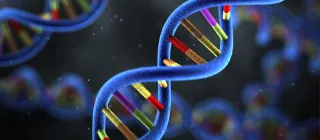
The Alarming Future of Mirror Life: Are We Playing with Fire?
2025-01-10
Author: Amelia
Title: The Alarming Future of Mirror Life: Are We Playing with Fire?
In the realm of science fiction, few tales resonate as strongly as that of "Star Trek's" iconic episode "Mirror, Mirror," where Captain Kirk and his crew encounter sinister doppelgängers in a twisted parallel universe. However, the real concerns echoed in scientific circles today revolve around the creation of artificial life forms—specifically, "mirror bacteria" that reflect life as we know it, but with a dangerous twist.
Recently, a group of scientists raised the alarm over the potential creation of mirror life in a thought-provoking paper titled "Confronting Risks of Mirror Life." Instead of fretting over evil clones, the researchers fear the ramifications of engineering bacteria whose molecular structures differ ever so slightly from our own. They argue that such creations could lead to catastrophic consequences for our immune systems, ecosystems, and overall health.
What Are Mirror Life Forms?
At the core of this concern lies the concept of chirality—a property of molecules that distinguishes between left and right versions, much like human hands. DNA in all known life on Earth uses a specific form of sugar called D-deoxyribose; however, mirror life would presumably be made up of L-deoxyribose and D-amino acids, creating a biological form entirely alien to our immune systems.
Pathogens are combated through our immune responses, fine-tuned to recognize and attack invading organisms. A bacterium constructed with mirror molecules could effectively evade this defense since its building blocks would not fit into the receptors designed to identify threats, allowing it to proliferate unnoticed and potentially wreak havoc.
The Risks of Mirror Bacteria
The scientists postulate various scenarios concerning the emergence of mirror bacteria. If these organisms could survive and multiply, they could evade our best antibiotics and potentially disrupt both plant and animal life. The thought of an invisible invader thriving in our bodies or environment presents a chilling possibility, akin to a sci-fi horror story unfolding in real life.
Mirror life could be synthesized either through a bottom-up approach—creating the entire cellular machinery from scratch—or a top-down method, where existing bacteria are reprogrammed to produce mirror molecules. This prospect raises an urgent question: in light of how easily laboratory accidents can occur, how could we ensure that such creations remain contained and do not introduce unforeseen biological disasters?
The Ethical Debate
While this research lays out expressive cautionary scenarios, it is essential to note that dissenting voices exist. Some scientists argue that the risks posed by mirror life forms are less significant than immediate threats like antibiotic-resistant bacteria and emerging viruses, which showcase real and current dangers to public health. There's also a proposition that we could develop mirror antibiotics to combat potential mirror bacteria if they ever emerged.
As we stand on the brink of deliberate manipulation of life on a fundamental level, deep conversations must be had about the ethics and safety surrounding synthetic biology. Just as we have imposed limits on the manipulation of viruses like smallpox, should we heed the warning and create a moratorium on the development of entire mirror organisms?
Conclusion: A Call for Vigilance
The implications of creating mirror life demand serious consideration. Scientific curiosity is a driving force behind innovation; however, we must balance this with a responsibility to assess risks meticulously. As echoed in the scientists' paper, society must approach this frontier with caution, or risk unleashing a biological enigma that even the brightest minds may struggle to rein in.
Let us reflect on the lessons from pop culture, merging fiction with reality. The journey into synthetic biology may lead us to groundbreaking discoveries, but it also comes with a dual-edged sword. It is imperative that we heed the warning signs, as future generations deserve to inherit a world that is at peace, not under siege from creations borne of human ambition.
Key Takeaways:
- Mirror bacteria could potentially evade our immune defenses, highlighting significant threats to health and the environment.
- While some argue that real risks from mirror life are exaggerated, the existence of powerful biological agents like drug-resistant bacteria must not be ignored.
- Ethical discussions surrounding synthetic biology must advance alongside scientific developments to ensure safety and accountability.



 Brasil (PT)
Brasil (PT)
 Canada (EN)
Canada (EN)
 Chile (ES)
Chile (ES)
 Česko (CS)
Česko (CS)
 대한민국 (KO)
대한민국 (KO)
 España (ES)
España (ES)
 France (FR)
France (FR)
 Hong Kong (EN)
Hong Kong (EN)
 Italia (IT)
Italia (IT)
 日本 (JA)
日本 (JA)
 Magyarország (HU)
Magyarország (HU)
 Norge (NO)
Norge (NO)
 Polska (PL)
Polska (PL)
 Schweiz (DE)
Schweiz (DE)
 Singapore (EN)
Singapore (EN)
 Sverige (SV)
Sverige (SV)
 Suomi (FI)
Suomi (FI)
 Türkiye (TR)
Türkiye (TR)
 الإمارات العربية المتحدة (AR)
الإمارات العربية المتحدة (AR)